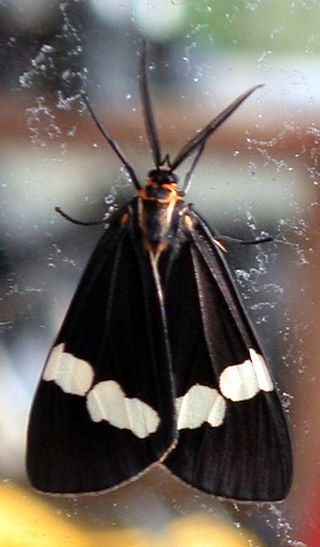
The banded cat-eyed snake is a species of mildly venomous, rear-fanged, colubrid snake, endemic to the New World.

Nyctemera is a genus of tiger moths in the family Erebidae first described by Jacob Hübner in 1820. The genus includes the species Nyctemera annulata and Nyctemera amica, which are closely related and are able to interbreed.

Theileria is a genus of parasites that belongs to the phylum Apicomplexa, and is closely related to Plasmodium. Two Theileria species, T. annulata and T. parva, are important cattle parasites. T. annulata causes tropical theileriosis and T. parva causes East Coast fever. Theileria species are transmitted by ticks. The genomes of T. orientalis Shintoku, Theileria equi WA, Theileria annulata Ankara and Theileria parva Muguga have been sequenced and published.

The brown wood turtle or brown land turtle is a species of turtle in the family Geoemydidae. The species is endemic to Central America and northern South America.

Trithemis annulata, known commonly as the violet dropwing, violet-marked darter, purple-blushed darter or plum-coloured dropwing, is a species of dragonfly in the family Libellulidae. It is found in most of Africa, in the Middle East, in the Arabian Peninsula and southern Europe. These insects are called dropwings because of their habit of immediately lowering their wings after landing on a perch. Males of this species are violet-red with red veins in the wings while females are yellow and brown. Both sexes have red eyes.

Diduga is a genus of moths in the family Erebidae.

Naja annulata, commonly known as the banded water cobra or the ringed water cobra, is a species of water cobra native to western and central Africa.

Nyctemera annulata, the magpie moth, is a moth of the family Erebidae. The species was first described by Jean Baptiste Boisduval in 1832. It is endemic to New Zealand and found in all parts of the country.

Triorbis annulata is a moth in the family Nolidae first described by Charles Swinhoe in 1890. It is found in Myanmar, Peninsular Malaysia, on Borneo and Luzon.

Bartholomea annulata is a species of sea anemone in the family Aiptasiidae, commonly known as the ringed anemone or corkscrew anemone. It is one of the most common anemones found on reefs in the Caribbean Sea.
This article lists the various snakes of Australia which live in a wide variety of habitats around the country. The amethystine python or scrub python is considered Australia's largest native snake.

Palpita annulata is a moth in the family Crambidae. It was described by Johan Christian Fabricius in 1794. It is found in India, Sri Lanka, Myanmar, China, Taiwan and Queensland, Australia.

Pterolophia is a genus of longhorn beetles of the subfamily Lamiinae, containing the following species:

Hypochrosis hyadaria is a geometer moth in the subfamily Ennominae described by Achille Guenée in 1857. The species has a wide range from India, Sri Lanka through Southeast Asia.
Pterolophia alboantennata is a species of beetle in the family Cerambycidae. It was described by Stephan von Breuning in 1938. It is known from Burma and Borneo.
Pterolophia fuscoapicata is a species of beetle in the family Cerambycidae. It was described by Stephan von Breuning in 1938. It is known from Myanmar.
Pterolophia quadrifasciata is a species of beetle in the family Cerambycidae. It was described by Charles Joseph Gahan in 1894. It is known from Myanmar and Malaysia.
Parvaverrucosa is an insect genus in the extinct, monotypic family Parvaverrucosidae, of the order Hemiptera. It contains the monotypic species Parvaverrucosa annulata known from the Cenomanian aged Burmese amber of Myanmar. First described in 2005, the genus was redescribed in 2019, which found it to be in the superfamily Palaeoaphidoidea

Begonia annulata, the ringed begonia, is a species of flowering plant in the genus Begonia native to the eastern Himalaya, Bangladesh, Assam in India, Myanmar, and Vietnam. It has gained the Royal Horticultural Society's Award of Garden Merit.













